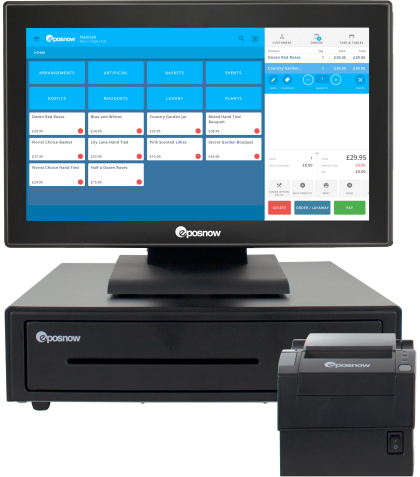Retail Management: Practical Advice For Businesses
Retail management is a complex and dynamic business that requires careful planning, attention to detail, and customer service. An experienced manager must ensure that all retail store operations run smoothly.
With the right approach, retail managers can help businesses succeed and adapt to changes in the retail industry. So we're giving you the lowdown on practical tips and advice from retail management experts to help your business grow.
By the end of the complete guide, you'll have everything you need to know about retail management, including:
- Understanding the retail industry: a significant part of retail management is understanding the retail industry and staying up-to-date with trends.
- Finding and maintaining customers: Retail managers need to know how to attract customers and keep them returning. We'll discuss marketing strategies, loyalty programs, and customer experience best practices.
- Managing employees: An effective retail manager can hire, train and motivate employees to ensure a successful store. We'll cover hiring and onboarding, setting expectations, creating a positive work environment, and more.
- Optimising inventory management: A successful retail store must manage its stock efficiently. We'll discuss stock turnover, forecasting, supply chain optimization, and more.
- Measuring performance: for your retail brand to be successful, it needs to measure performance to make informed decisions. We'll cover topics like sales metrics, KPIs, and industry benchmarks.
- Improving Productivity: A retail manager must maximise productivity to create a successful store. We'll discuss topics like process optimization, automation, and more.
- Staying ahead of the curve: An effective retail manager must stay ahead of new technologies. We'll discuss topics like personalization, omnichannel strategies, and more.
Let's get started.
What is retail management?
Before diving into the practical tips and advice, let's look at what retail management is all about. Retail management involves overseeing all retail store operations, from customer acquisition and retention to inventory control, pricing, financials, and more. It takes an experienced manager to manage all retail operations effectively.
The retail management process starts with identifying customer needs and wants. Retailers must identify what products and services customers are looking for, understand the market, and develop strategies to capitalise on this.
Retail management job description
Retail managers are responsible for overseeing the daily operations of a store and ensuring that it runs smoothly. Here are some skills and requirements for successful retail management.
Retail managers must develop and maintain relationships with customers
A retail manager should have excellent customer service skills and the ability to build relationships with customers. If you're interviewing for a store manager position, highlight your ability to build customer relationships on the sales floor. Some practical examples you could give include how you handled customer complaints, offered solutions to customers' problems, or exceeded their expectations.
Retail managers must manage employees effectively
Retail managers are also responsible for hiring, training, and managing staff. They must be able to motivate the team and ensure that everyone is following the company's rules and regulations.
Store managers should have experience in recruiting, interviewing, and selecting the right employees. You'll also need to be able to effectively manage staff performance and ensure that they are meeting their sales targets.
Retail managers must optimise inventory management
Inventory control is essential for retail stores. Store managers should understand how to track stock levels, set pricing, monitor sales trends, and order new products. In addition, you'll need to optimise the store layout for maximum efficiency and ensure that all products are available when customers need them.
Retail managers must analyse financials
Retail managers are also responsible for analysing financial reports and managing budgets. You should have a good understanding of accounting principles and the ability to read financial statements. This includes interpreting and analysing data, such as sales figures, budget allocation, and profitability.
These are just a few of the skills necessary for retail store managers. As you can see, it takes an experienced manager to ensure that retail operations are smooth and efficient.
Understanding the retail industry
The retail industry is constantly evolving, and staying ahead of trends is essential for success. It's important to do your research and understand the needs of customers in your area and how you can position yourself to stand out from the competition. You should also be aware of changes in consumer behaviour due to technological advancements such as online shopping and mobile devices.
When it comes to retail management, it's important to keep up with the latest trends in today's retail industry. This includes understanding consumer expectations, staying on top of new product lines, and monitoring competitor activity.
Types of retail stores
There are several different types of retail businesses, each offering different services and products. Here are some types of stores you might consider managing:
- Department stores: this type of retail establishment sells a variety of items from multiple categories, including clothing, home goods, and electronics. In retail management, this type of store requires the most oversight.
- Grocery stores: these stores sell a variety of food and beverages, including produce and packaged foods. Regarding retail management, grocery stores require strong customer service and inventory management skills.
- Clothing stores: specialising in apparel and accessories for men, women, and children. Retail management in this store requires an in-depth understanding of fashion trends and a keen eye for detail.
- Home improvement stores: this type of retail store specialises in stocking building materials, tools, and home décor items like furniture or decorations. As a store manager, you'd need to know about the available products and services.
- Convenience stores: providing quick access to basic items like snacks, drinks, and other convenience items.
- Specialty stores: this retail store specialises in specific product categories or brands. A store manager would need to stay on top of trends in the industry and understand how their store fits into the retail landscape.
- Electronics stores: computers, smartphones, and home entertainment products are all sold in this retail store. Store managers must provide adequate staff training so customers can easily find what they're looking for.
- Jewellery stores: specialising in fine jewellery, watches, and other luxury items. Store managers must understand the value of each item and be able to provide customers with accurate information.

The All-in-One Retail EPOS System
Thrive with omnichannel selling options, multi-location inventory management, a versatile EPOS solution that meets your business needs, and more.
Retail management and marketing
Customer acquisition is essential for every retail business, but retaining customers is just as important. You should focus on building relationships with customers, provide excellent customer service, and offer promotions and discounts to keep them coming back.
You can also use a variety of marketing techniques, such as:
Email marketing
This is an effective way to reach out to customers and keep them updated on new products and offers. Suppose you're managing a clothing boutique. In that case, you could send out weekly emails with new arrivals, tips on how to style them, and special discounts.
Social media
Social media is an excellent tool for getting your business noticed and engaging with customers. You can use platforms such as Instagram, Facebook, and Twitter to post updates about new products, share images of what customers have bought and engage in conversations.
For example, if you're managing a flower shop, you might post images of beautiful seasonal arrangements and offer custom bouquets. Or, you could use influencers to create social media content about your store.
Search engine optimization (SEO)
SEO can help improve your visibility and draw more traffic to your store resulting in more online sales. For example, suppose you manage an eCommerce store. In that case, you should optimise your website for keywords related to your products and include product reviews to rank higher on search engine results pages. Blogs, infographics, and videos are also great ways to improve SEO.
Public relations
Public relations (or PR) can help you get positive press and exposure for your store. For example, if you're managing a bookstore, you could organise events such as book signings and author appearances to attract more customers. You could then invite journalists and bloggers to cover the event and create positive press. Or if you're marketing for the holidays, why not host special in store events for the media where they can create content with your products?
Retail management and employee management
Employees are one of the most critical assets of a retail company, so it's important to ensure they have the skills and knowledge to perform their duties efficiently. Careful recruitment is essential, as is providing ongoing training and support to help employees stay updated with industry trends and techniques.
Here are five tips for managing retail employees:
Provide clear job descriptions and expectations for each employee
Your employees need to know what is expected of them in order to do their job effectively. Make sure you provide each employee with a detailed job description outlining their duties and responsibilities, as well as any training they may need to complete.
Implement effective performance management processes
Monitoring employees' performance and providing feedback can help ensure they meet expectations and stay on track. Implement performance management processes such as regular check-ins, performance reviews, and goal setting to keep your employees motivated and engaged.
Give employees access to the right tools
Provide your employees with access to the right tools, such as a point of sale system or inventory management software, that will help them do their job more efficiently.
Support career development
Supporting employees' career goals can be a great way to motivate and retain staff. Offer training opportunities such as courses or workshops to help employees get the skills they need to progress in their careers.
Use a POS system
A point of sale system can be a great tool for managing retail staff. You can use a POS system to track sales, manage inventory and staff schedules, as well as generate reports. This can help you stay on top of daily operations and ensure your employees are working productively.
Why not make a contest out of it? You could offer a reward for the employee with the highest sales or the most customer reviews to motivate them and make them feel valued.
These are just some tips on how to manage retail employees effectively. By providing your staff with the right training, tools, and support, you can ensure they have the skills and knowledge to do their job efficiently and help your retail business succeed.
TIP: Own a hospitality business? Check out our hospitality POS or restaurant POS systems.
Retail management and managing inventory
Inventory management is a crucial component of retail success. Having the right products in stock is essential while ensuring stock levels don't exceed demand.
To ensure efficient inventory management, retail managers should develop an accurate forecasting system and track sales data to anticipate customer demand. They should also take advantage of technology, such as automated ordering systems, which can help reduce costs and improve efficiency.
TIP: A retail POS (point-of-sale) system can also be used to track customer purchases and preferences, as well as inventory levels.
Retail management and measuring performance
Setting measurable goals and tracking performance is essential for any retail business. This can be done by tracking key performance indicators (KPIs) such as sales volume, customer satisfaction, employee retention, and profitability.
It's also important to set realistic yet achievable goals that are aligned with your overall business objectives. Regularly reviewing KPIs and making adjustments when necessary will help you stay on track and ensure your business is heading in the right direction.
Retail management and improving productivity
Retail businesses should look for ways to streamline operations, reduce costs and improve productivity. This can be done by leveraging technology such as automation and analytics, as well as improving processes and eliminating waste.
Some strategies for improving productivity include:
- Automating mundane tasks such as inventory management and customer service
- Outsourcing non-core operations to specialist providers
- Implementing workforce scheduling systems to ensure staff are deployed efficiently
- Introducing training initiatives to improve employee skills
- Utilising data analytics for better decision making
How can a POS system help in retail management?
A POS system can help retail businesses in many ways, including:
Streamlining checkout processes
Suppose you are running a retail store. With a POS system, you can streamline checkout processes by quickly scanning barcodes, recording customer payment information, and issuing receipts. This helps reduce the time it takes to process sales and improves customer satisfaction.
POS hardware solutions can also reduce waiting times and improve accuracy, such as barcode scanners, card readers, and cash drawers. Similarly, software solutions such as inventory management systems can help managers track product levels and order supplies when needed.
Enhancing customer service
A POS system can also improve the customer experience by providing helpful information (e.g., product descriptions, images, size/colour options) and allowing customers to purchase products online and in-store.
This helps create a more personalised shopping experience and can help increase customer loyalty over time. It also makes tracking customers' buying habits easier, which can be used to target promotions or special offers to the right customers.
Analysing sales data
A POS system can be used to analyse sales data and gain valuable insights into customer behaviour. This data can then be used to inform marketing decisions and develop retail management strategies.
Some detailed reports that can be generated with a POS system include the following:
- Top selling products: find out which products are most popular
- Customer segmentation: determine which customer segments make up the majority of sales
- Sales trends: track sales patterns over time to identify market trends
- Time comparison: compare sales figures between different periods
- Non-selling stock: analyse data to identify slow-moving or non-selling stock
Integrated payment processing
A POS system also makes it easy to accept payments from customers. It can be integrated with payment processing solutions such as credit/debit cards, PayPal and Apple Pay.
This helps boost sales by providing customers with more ways to pay and reduces the time taken for transactions, improving customer satisfaction.
TIP: Find out more about how our payment processing services can help your retail business.
Final thoughts
So there you have it. A complete guide on how to win the retail management game.
Retail management is a complex process and requires careful planning and execution. To ensure success, retail managers should focus on streamlining operations, improving customer experience, and utilising data analytics to drive decisions.
Investing in the right tools, such as a POS system, can help you get there faster. With its integrated payment processing solution and detailed sales reports, a POS system can help you stay organised and increase sales.
If you have any questions about retail management or how a POS system can benefit your business, please contact us. We'd be happy to help!
Good luck on your journey to retail success!
Want to learn more about different management roles? Check out our complete guides below:
Talk to our team of experts about how a retail POS system can help your business grow!



